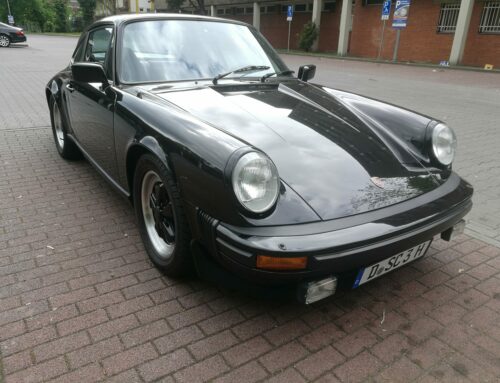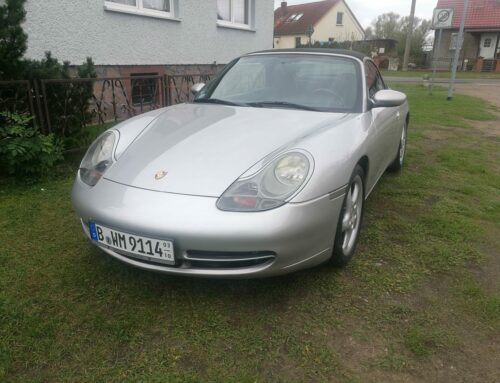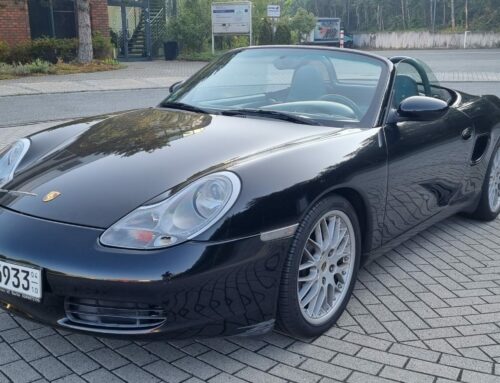Porsche a Company with Family Tradition
Index
| Description of the Company |
| Founder of the Company |
| Company History |
| Company Figures |
| Lineup of the Company |
Porsche is a renowned German automobile manufacturer that has established itself as a symbol of luxury, performance, and cutting-edge automotive engineering. Founded in 1931 by Ferdinand Porsche, the company’s rich heritage and legacy are deeply rooted in its commitment to excellence, innovation, and creating iconic sports cars.
One of the hallmarks of the Porsche brand is its unmistakable design language that effortlessly blends elegance, athleticism, and aerodynamic efficiency. With sleek, curvaceous bodywork, muscular contours, and distinctive features like the classic rounded headlights, Porsche cars are instantly recognizable and exude a sense of power and sophistication.
Porsche has been at the forefront of automotive technology for decades, continuously pushing the boundaries of what is possible on the road. Renowned for their engineering prowess, Porsche vehicles are built with precision and meticulous attention to detail, incorporating state-of-the-art advancements that enhance performance, safety, and driving dynamics.
Performance is the core essence of a Porsche, and the brand’s extensive lineup caters to a wide range of driving enthusiasts. From the iconic 911 – a symbol of automotive excellence for over half a century – to the versatile Cayenne SUV, each Porsche model delivers exhilarating acceleration, agile handling, and a visceral driving experience that sets the standards for others to follow.
Porsche’s commitment to performance is evident through its relentless pursuit of speed, highlighted by their range of high-performance variants like the Porsche 911 GT3, GT2 RS, and Panamera Turbo. These models incorporate advanced aerodynamics, lightweight construction, and powerful engines, enabling them to achieve blistering acceleration and impressive top speeds that rival supercars.
In recent years, Porsche has also embraced electrification and developed a range of hybrid and all-electric vehicles that combine sustainable mobility with exceptional performance. The Porsche Taycan, for example, is an all-electric sports car that provides instantaneous torque, impressive range, and delivers an unparalleled driving experience while emitting zero tailpipe emissions.
Inside a Porsche, craftsmanship and luxury seamlessly blend with cutting-edge technology. The cabin exudes an air of sophistication and refinement, featuring premium materials, meticulously designed controls, and a driver-focused layout. Advanced infotainment systems, digital displays, and connectivity features enhance the driving experience while ensuring convenience, safety, and seamless integration with modern lifestyles.
Moreover, Porsche’s commitment to customer satisfaction extends beyond the showroom. The brand offers comprehensive aftersales support, including reliable service centers and an extensive network of dealerships around the world, ensuring that Porsche owners receive exceptional service, maintenance, and support throughout their ownership experience.
In conclusion, Porsche stands as a pinnacle of automotive excellence, combining unparalleled performance, impeccable craftsmanship, and timeless design. With a legacy spanning over eight decades, the brand continues to push the boundaries of automotive engineering, creating cars that inspire passion, thrill their drivers, and leave an indelible mark on the roads they traverse.
Ferdinand Porsche: The Visionary Behind the Iconic Porsche Brand
Introduction:
Behind the sleek lines and raw power of every Porsche vehicle lies the indomitable spirit of its founder, Ferdinand Porsche. Widely regarded as one of the most influential automotive engineers of the 20th century, Ferdinand Porsche’s unwavering passion for innovation, unrelenting pursuit of perfection, and commitment to pushing boundaries continue to shape the Porsche brand to this day, cementing its status among the automotive elite.
Early Life and Career:
Born on September 3, 1875, in Maffersdorf, Czech Republic (formerly part of the Austro-Hungarian Empire), Ferdinand Porsche’s fascination with mechanics and engineering began at a young age. Exemplifying his insatiable thirst for knowledge, he quickly rose through the ranks as an apprentice at various engineering firms. In 1900, Porsche joined Jacob Lohner & Company, an electric vehicle manufacturer, taking on the role of technical director.
Entrepreneurial Spirit:
Driven by an entrepreneurial spirit, Ferdinand Porsche established his own engineering consultancy in 1931, which would later evolve into the iconic Porsche brand we know today. His visionary approach and technical expertise attracted prestigious clients such as Daimler-Benz and Auto Union, underpinned by his signature design principles and innovative solutions. Notably, Porsche played a pivotal role in the creation of the Volkswagen Beetle, often referred to as the “People’s Car.”
Birth of the Porsche Brand:
In 1948, Ferdinand Porsche achieved a long-held dream when he unveiled the first Porsche vehicle, the iconic Porsche 356. This groundbreaking sports car, blending elegance, performance, and precision engineering, laid the foundation for Porsche’s illustrious lineage of sports cars. Porsche’s relentless pursuit of excellence and commitment to motorsport not only established the brand’s reputation but also paved the way for numerous victories in automotive racing.
Engineering Excellence and Innovation:
Porsche’s engineering genius was a driving force behind the brand’s success. His relentless pursuit of innovation birthed numerous breakthroughs, including the development of the world’s first hybrid vehicle, the Semper Vivus, in 1900. Furthermore, Porsche’s engineering philosophy emphasized the synergy between performance, handling, and comfort, resulting in legendary models like the Porsche 911, 914, and 959.
Legacy and Impact:
Ferdinand Porsche’s visionary designs, engineering innovations, and entrepreneurial spirit have left an indelible mark on the automotive industry. His unwavering commitment to excellence and meticulous attention to detail continue to shape the Porsche brand’s DNA. Today, Porsche stands as a symbol of automotive supremacy, embodying a legacy forged by Ferdinand Porsche’s unrelenting passion for automotive perfection.
Conclusion:
Ferdinand Porsche’s pioneering spirit and unwavering dedication have positioned him as an automotive legend and the driving force behind the globally renowned Porsche brand. His legacy lives on in every Porsche vehicle, reflecting his commitment to engineering excellence, innovation, and creating unforgettable driving experiences. As the brand continues to evolve, Ferdinand Porsche’s trailblazing vision remains a guiding light, inspiring future generations of automotive enthusiasts, and solidifying Porsche’s status as an unparalleled icon in the world of cars.
Porsche History
Porsche is a manufacturer with a rich and illustrious history in the automotive industry. Founded by Ferdinand Porsche in 1931, the company has become synonymous with luxury, performance, and innovation. Here is a detailed chronicle of the brand’s evolution over the years:
1. Early Years (1930s):
– In 1931, Ferdinand Porsche established his own engineering consultancy, and soon after developed the legendary Volkswagen Beetle.
– In 1938, the first-ever Porsche-branded vehicle, the Porsche 64, was built. It was based on the Beetle platform and showcased the brand’s engineering prowess.
2. Post-War Expansion (1940s-1950s):
– After World War II, Ferdinand’s son, Ferry Porsche, introduced the iconic Porsche 356, the brand’s first production car, in 1948.
– The 356 quickly gained a reputation for its nimble handling and distinctive design, establishing Porsche as a sports car manufacturer.
3. The Birth of the 911 (1960s):
– In 1963, Porsche unveiled the iconic 911, which would go on to become one of the most recognizable sports cars of all time.
– The 911’s rear-engine layout, timeless design, and exhilarating performance captured the hearts of enthusiasts worldwide.
4. Racing Dominance (1960s-1970s):
– Porsche achieved remarkable success in motorsport during this era, winning numerous races, including the prestigious 24 Hours of Le Mans endurance race.
– The brand’s racing pedigree helped enhance its reputation for performance and reliability.
5. Introduction of Transaxle Models (1970s-1990s):
– To diversify its lineup, Porsche introduced the 914 in collaboration with Volkswagen in the 1970s. It featured a mid-engine layout.
– In the 1980s, Porsche launched the 924, 944, and 928 models, known as Transaxle models, which featured front-engine layouts and aimed for increased practicality without sacrificing performance.
6. The Boxster and Cayenne Era (1990s-2000s):
– In 1996, Porsche introduced the Boxster, a mid-engine convertible sports car that offered a more affordable entry point into the brand.
– The early 2000s saw a controversial move with the introduction of the Porsche Cayenne, the brand’s first SUV. Though questioned by purists, the Cayenne became a commercial success, expanding Porsche’s customer base and financial stability.
7. Expansion and Modernization (2010s-present):
– Porsche continued to expand its lineup with the introduction of the Panamera, a luxury four-door sedan, in 2009.
– In recent times, Porsche has embraced electric mobility with the launch of the all-electric Taycan in 2019, showcasing the brand’s commitment to sustainability and cutting-edge technology.
Throughout its history, Porsche has maintained its commitment to superior engineering, precision craftsmanship, and an engaging driving experience. The brand’s legacy of producing high-performance sports cars and its dedication to innovation have solidified Porsche’s position as one of the world’s most respected and coveted automotive manufacturers.
Seize and the Markets: A Comprehensive Analysis of Porsche’s Sales
Introduction:
Porsche is a renowned luxury car manufacturer, known for its exceptional engineering, performance, and design. This article provides a detailed analysis of Porsche’s sales performance, market presence, and factors contributing to its success.
1. Global Market Presence:
Porsche has consistently established a strong presence in various international markets, including North America, Europe, Asia, and the Middle East. Its sales network spans over 170 countries, making it a truly global brand. The company’s rich heritage, exceptional product lineup, and efficient marketing strategies have contributed to its success across these markets.
2. North American Market:
The United States and Canada are among Porsche’s top-selling markets. The brand has witnessed significant growth in these regions, driven by factors such as increasing disposable income, a growing preference for luxury vehicles, and a strong dealership network. Additionally, the successful launch of popular models like the Porsche 911 and Cayenne SUV has further contributed to the brand’s sales in North America.
3. European Market:
Porsche has a strong foothold in its home continent, Europe. Countries like Germany, the UK, and Italy have shown consistent demand for Porsche vehicles. The company’s emphasis on performance-oriented models, superior craftsmanship, and advanced technology has resonated well with European customers. The increasing popularity of electric and hybrid vehicles has also boosted Porsche’s sales in this market, with models like the Taycan gaining significant traction.
4. Asian Market:
Asia has emerged as a promising market for luxury car manufacturers, and Porsche is no exception. China, in particular, has witnessed a remarkable surge in Porsche’s sales due to its expanding affluent class and growing preference for high-end vehicles. Porsche’s SUV lineup, including the Macan and Cayenne, has been well-received in Asian markets, combining luxury with practicality.
5. Middle Eastern Market:
The Middle East region has always been a significant market for luxury car brands, and Porsche has successfully capitalized on this demand. Countries like Saudi Arabia, the United Arab Emirates, and Qatar are known for their high per capita income and luxury lifestyle, making them ideal destinations for Porsche. The company’s diverse product range, which includes both sports cars and SUVs, caters to the region’s diverse customer preferences.
6. Factors Driving Porsche’s Sales Success:
Several factors contribute to Porsche’s continued sales growth:
a. Brand Reputation: Porsche’s legacy of engineering excellence, motorsport heritage, and consistent product quality instills trust and loyalty among customers.
b. Product Range: A diversified lineup, consisting of sports cars like the 911, iconic models like the Boxster and Cayman, and SUVs like the Macan and Cayenne, caters to a wide range of consumer preferences and market demands.
c. Technological Innovations: Porsche’s commitment to technological advancements, including the development and integration of electric and hybrid powertrains, has kept the brand at the forefront of automotive innovation.
d. Marketing and Customer Engagement: Porsche’s effective marketing campaigns, sponsorship of motorsports events, and customer-centric approach through initiatives like Porsche Experience Centers have helped cultivate a strong and engaged customer base.
Porsche’s outstanding sales performance and global market presence can be attributed to its strong brand reputation, diversified product range, technological innovations, effective marketing strategies, and a relentless commitment to customer satisfaction. As the luxury car market evolves, Porsche’s ability to stay ahead of trends and cater to changing consumer demands will likely continue to drive its success in the years to come.
Porsche Lineup: A Blend of Power, Elegance, and Precision
Current Lineup:
1. Porsche 911:
The quintessential sports car, the Porsche 911 has been an icon since its debut in 1963. Known for its rear-engine layout, timeless design, and exhilarating performance, the 911 offers a range of variants to suit different driving preferences, from the Carrera models for everyday use to the Turbo and GT3 for ultimate track performance.
2. Porsche 718:
The 718 lineup comprises the Boxster and the Cayman, two mid-engine sports cars that blend top-down driving pleasure with precise handling. The Boxster is a convertible roadster, while the Cayman is a sleek coupe. Both models offer exhilarating performance, thanks to their lightweight construction and turbocharged engines.
3. Porsche Taycan:
Marking Porsche’s electrification journey, the Taycan is a sleek, all-electric sport sedan. Combining sustainability with performance, the Taycan offers a range of models, including the Turbo, Turbo S, and recently introduced base model. With blistering acceleration and an impressive electric range, the Taycan is a testament to Porsche’s commitment to innovation.
4. Porsche Panamera:
The Panamera is Porsche’s luxury sedan offering, redefining the boundaries of comfort and performance. Combining the elegance of a coupe with the practicality of a sedan, the Panamera features cutting-edge technology, a luxurious interior, and a range of powertrain options, including hybrid and powerful Turbo models.
5. Porsche Macan:
As Porsche’s compact SUV, the Macan combines impeccable handling with versatile functionality. Offering a range of models, the Macan caters to different tastes, from the entry-level Macan to the high-performance GTS and Turbo variants. With its refined design, advanced technology, and spirited driving dynamics, the Macan is an enticing option in the SUV segment.
Historical Icons:
1. Porsche 356:
The first production car bearing the Porsche name, the 356 was introduced in 1948. Sporting a rear-engine, rear-wheel-drive layout, this lightweight, nimble car laid the foundation for Porsche’s success. The 356 showcased timeless design and became an instant classic.
2. Porsche 959:
Considered one of the greatest supercars of its time, the 959 debuted in the mid-1980s. Boasting advanced technology and all-wheel drive, the 959 was ahead of its time. With its blistering performance and iconic design, it set the stage for future Porsche models.
3. Porsche Carrera GT:
The Carrera GT, introduced in 2004, was a masterpiece of engineering. Powered by a V10 engine, this mid-engine supercar delivered mind-bending performance and featured a lightweight carbon fiber chassis. Its raw power and exotic design made it a dream car for many enthusiasts.
Porsche’s lineup seamlessly combines a rich history with cutting-edge technology and unparalleled performance. From the timeless 911 to the innovative Taycan, each model reflects Porsche’s commitment to delivering exhilarating driving experiences. Whether you seek a sports car, a luxury sedan, or an SUV, Porsche offers a range of options to satiate your automotive desires.



